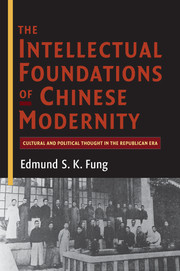 The Intellectual Foundations of Chinese Modernity
The Intellectual Foundations of Chinese Modernity Published online by Cambridge University Press: 03 May 2010
China in the 1930s saw the rise of state socialism (guojia shehui zhuyi) as an intellectual current and political movement linked to the minor Chinese State Socialist Party (Zhongguo Guojia Shehuidang), or SSP. State socialism is not defined here as the doctrine that all the affairs of the nation should be managed by the state, regardless of individual choice, or as a form of social organization in which ownership and control of the means of production is all in the hands of the state. Instead, it is interpreted in a Chinese context as evolutionary socialism based on the idea of a strong state and government with a plan, as described in Chapter 5. Chinese state socialism was not an ideology resembling Nazism. It did not have the main characteristics of fascism: antiparliamentarianism, antiliberalism, antibourgeoisie, racism, eugenics, ethnic nationalism and mass movements. It had no links with the Blue Shirts movement, which pledged absolute loyalty to Chiang Kai-shek. Nor was it part of the less-known Italian connection of the 1930s, on which Michael Godley has written. It also had nothing to do with the New Life Movement, which Frederic Wakeman Jr interpreted as a form of ‘Confucian fascism’. Chinese state socialism differed from fascism in that it opposed the notion of the dictator, one-party rule and political tutelage, and it never became a mass movement.
To save this book to your Kindle, first ensure no-reply@cambridge.org is added to your Approved Personal Document E-mail List under your Personal Document Settings on the Manage Your Content and Devices page of your Amazon account. Then enter the ‘name’ part of your Kindle email address below. Find out more about saving to your Kindle.
Note you can select to save to either the @free.kindle.com or @kindle.com variations. ‘@free.kindle.com’ emails are free but can only be saved to your device when it is connected to wi-fi. ‘@kindle.com’ emails can be delivered even when you are not connected to wi-fi, but note that service fees apply.
Find out more about the Kindle Personal Document Service.
To save content items to your account, please confirm that you agree to abide by our usage policies. If this is the first time you use this feature, you will be asked to authorise Cambridge Core to connect with your account. Find out more about saving content to Dropbox.
To save content items to your account, please confirm that you agree to abide by our usage policies. If this is the first time you use this feature, you will be asked to authorise Cambridge Core to connect with your account. Find out more about saving content to Google Drive.